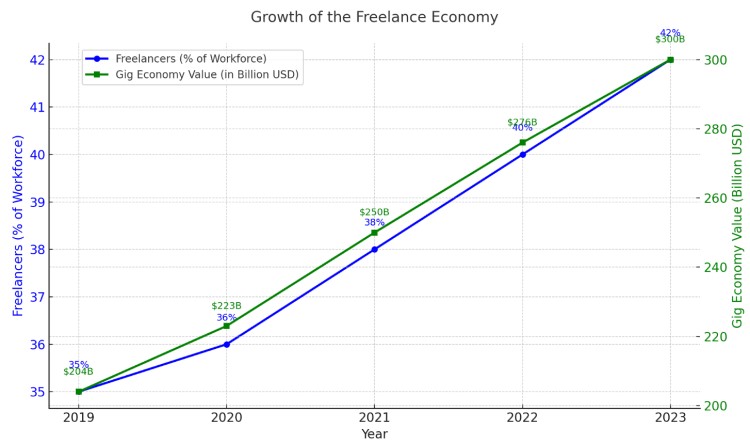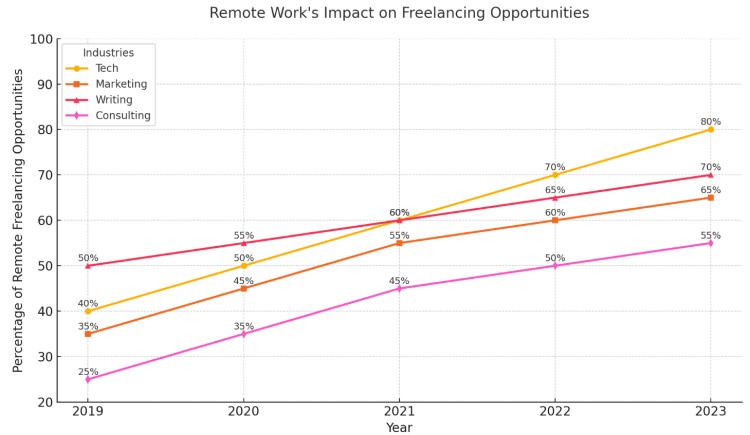 Freelancing is rapidly transforming the workforce and changing how people approach their careers. Trends in freelance work highlight its growing popularity across industries. Technology, remote work, and demand for specialized skills are driving this shift, offering new opportunities for independent professionals like you.
Freelancing is rapidly transforming the workforce and changing how people approach their careers. Trends in freelance work highlight its growing popularity across industries. Technology, remote work, and demand for specialized skills are driving this shift, offering new opportunities for independent professionals like you.
Freelancers now play a key role in the global economy. Businesses increasingly rely on freelancers to fill skill gaps and complete specific projects. This shift creates more flexibility for workers but also brings unique challenges, such as managing income and finding benefits.
Understanding trends in freelance work can help you navigate this evolving career path. By leveraging tools and resources, you can thrive in this competitive yet rewarding environment. Whether freelancing full-time or as a side hustle, staying informed ensures you stay ahead in this growing market.
Growth of the Freelance Economy
The freelance economy has grown rapidly, fueled by flexible work arrangements as well as a shift in how people approach their careers. More professionals are choosing freelancing as a primary source of income or a supplemental option. This shift reflects changing priorities in work-life balance and job flexibility.
Recent statistics highlight the scale of this trend. According to industry reports, freelancers now make up over 35% of the global workforce. Projections suggest that by 2027, freelancers could become the majority of workers in certain regions. These numbers show how trends in freelance work continue to reshape traditional employment models.
Technology has played a major role in this expansion. Online platforms like Upwork and also Fiverr connect freelancers with clients worldwide, creating a thriving marketplace for talent. Social media and personal branding tools also help freelancers market their skills more effectively. These resources make it easier for you to access opportunities in this growing economy.
The freelance economy is no longer limited to creative industries. Businesses increasingly rely on freelancers for specialized tasks, from software development to financial consulting. As demand for skilled professionals grows, freelancing provides you with more options to choose projects that align with your expertise and goals.
Understanding trends in freelance work can help you explore the opportunities this growing economy offers. Whether as a full-time career or a side venture, freelancing continues to gain popularity as a flexible and sustainable work model.
Remote Work’s Role in Freelancing Trends
Remote work has significantly influenced trends in freelance work, creating new opportunities and greater flexibility across many industries. The shift to remote work has made location less important, allowing freelancers to collaborate with clients globally. This change has opened up markets that were once inaccessible.
The rise of remote work tools has also helped freelancers succeed. Platforms like Zoom, Slack, and Asana simplify communication and also project management. These tools allow you to work seamlessly with clients and teams, no matter where they are. By bridging geographic gaps, remote work has expanded the types of projects available to freelancers.
Many industries now rely on freelancers for specialized tasks, thanks to remote work. Fields like technology, marketing, and consulting have embraced this model. Companies often turn to freelancers for flexibility, avoiding the costs of hiring full-time staff. This has increased demand for your skills in a wide range of fields.
Remote work has also improved work-life balance for freelancers. You can set your own schedule as well as choose projects that fit your goals. This flexibility is a major reason why freelancing continues to grow. As remote work evolves, it will likely drive even more changes in how freelancing operates globally.
Trends in freelance work show that remote work has become a key driver of growth. By leveraging remote opportunities, you can expand your reach, improve your workflow, and thrive in the evolving freelance landscape.
Demand for Specialized Skills
The demand for specialized skills has become a driving force behind trends in freelance work. Businesses increasingly seek freelancers with expertise in fields like technology, design, and digital marketing. This shift allows companies to access high-quality talent without long-term commitments.
Technology freelancers, such as developers and cybersecurity experts, are in high demand. As businesses embrace digital transformation, they need skilled professionals to build and secure their systems. Freelancers with these niche skills often command premium rates and also flexible project opportunities.
Design and creative roles are also central to the growing freelance market. Companies frequently hire freelancers for branding, web design, and also multimedia projects. These tasks require specialized talent, and freelancers offer a cost-effective way to access this expertise. If you have creative skills, you can take advantage of these expanding opportunities.
Digital marketing continues to grow as a critical area for freelancers. Businesses need specialists in SEO, social media management, and content strategy to stay competitive. By focusing on a specific niche, you can stand out as well as attract clients looking for targeted expertise.
Trends in freelance work highlight a shift toward hiring for specific skills rather than broad roles. As businesses prioritize expertise, freelancers with specialized knowledge are increasingly valuable. By honing your skills and marketing your expertise, you can position yourself for success in this evolving marketplace.
Technology and Platforms Supporting Freelancers
Technology and platforms have revolutionized freelancing by simplifying how you find work as well as manage your business. These tools make connecting with clients and organizing projects more efficient. Trends in freelance work show that technology continues to drive growth and improve opportunities for independent professionals.
Online marketplaces like Upwork, Fiverr, and Toptal allow you to showcase your skills and also connect with clients worldwide. These platforms offer features like secure payment processing, project tracking, and client reviews. They reduce the effort of finding work and build trust between freelancers and clients.
Management tools are also essential for streamlining your workflow. Apps like Trello and Asana help you track tasks and deadlines. Platforms such as QuickBooks and FreshBooks simplify invoicing and financial management. These tools save you time, allowing you to focus on delivering quality work.
Communication apps like Zoom and Slack keep you connected with clients and teams. They facilitate virtual meetings and seamless collaboration across projects. These tools help bridge communication gaps, making remote freelancing more effective and productive.
Trends in freelance work emphasize the importance of using technology to stay competitive. By adopting the right platforms, you can market your skills, manage projects, and maintain strong client relationships. Embracing these tools ensures your freelancing business runs efficiently and grows over time.
The Rise of Freelance Teams and Collaboration
The rise of freelance teams is reshaping how freelancers approach work. Many are joining forces to handle larger projects and expand their services. This collaborative trend allows freelancers to combine skills, attract more clients, and take on complex assignments.
Freelance teams often operate like small agencies, offering multiple services under one brand. For example, a writer, designer, and marketer might collaborate to provide comprehensive content solutions. This approach makes it easier for clients to manage projects while giving you access to higher-value opportunities.
Collaboration also helps freelancers scale their businesses. By pooling resources and expertise, teams can handle larger workloads and meet tight deadlines. Technology supports these efforts with tools for project management, communication, and file sharing. Platforms like Slack and Notion make it simple to stay organized and connected.
Trends in freelance work show that clients increasingly value teams for their efficiency and diverse skill sets. Freelance groups offer a competitive edge by providing tailored solutions and also delivering consistent results. As this trend grows, forming or joining a team can help you reach new levels of success.
By embracing collaboration, you can expand your network, share resources, as well as tackle more ambitious projects. This shift in freelancing highlights how teamwork enhances opportunities in a fast-evolving industry.
Challenges Freelancers Face and Emerging Solutions
Freelancers face unique challenges that can make work unpredictable. Inconsistent income is a common issue, especially when projects are short-term or irregular. Without a steady paycheck, you may struggle to manage expenses or plan for the future. However, emerging tools and platforms are helping freelancers address this uncertainty.
Income tracking apps like Wave and Cushion allow you to monitor earnings and anticipate financial gaps. Some platforms, such as Bonsai, even offer income smoothing features. These solutions help you budget effectively and maintain financial stability despite fluctuating client demands. As trends in freelance work evolve, these tools are becoming essential.
The lack of benefits, such as health insurance and retirement plans, is another challenge. Many freelancers rely on marketplaces like Stride Health or Freelancers Union to access affordable benefits. These services bridge the gap, offering plans tailored for independent workers. They provide options that make freelancing more sustainable over the long term.
Managing clients can also be difficult, especially when handling multiple projects at once. Freelancers often face late payments or unclear expectations. Tools like HoneyBook and also Dubsado simplify client management by automating contracts, invoicing, and follow-ups. By streamlining workflows, these platforms save time as well as improve client relationships.
Trends in freelance work show a growing focus on tools and services designed to solve these challenges. Adopting the right resources can help you overcome obstacles and focus on growing your freelance business. With better support, freelancing becomes a more reliable and rewarding career choice.
Conclusion
Trends in freelance work continue to shape how professionals approach flexibility and independence in their careers. The demand for specialized skills, the rise of remote work, and the availability of advanced tools are driving these changes. As freelancing evolves, you have more opportunities to align your work with your goals.
Despite its challenges, freelancing offers solutions that make it a sustainable option for many. Tools for income tracking, client management, and benefits access are improving the freelancing experience. By adopting these resources, you can address uncertainties and build a more secure freelance career.
Freelancers who stay adaptable as well as embrace collaboration will thrive in this expanding economy. Understanding trends in freelance work helps you navigate the challenges and also take advantage of new opportunities. With the right strategies, freelancing can be a fulfilling and reliable career path for you.





